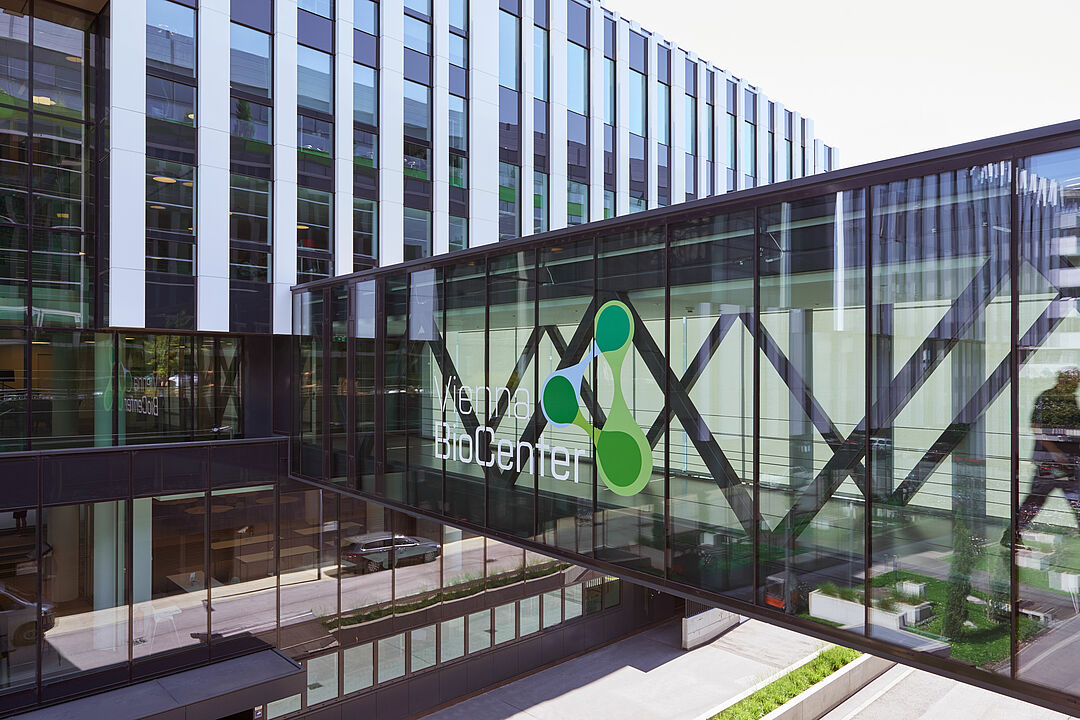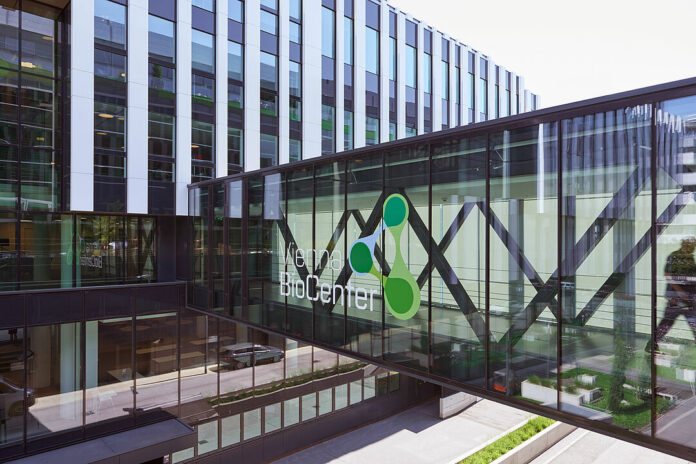Bildnachweis: andreasbuchberger.com.
Austria has earned an outstanding reputation as a research and production location in the life sciences – thanks to the synergy between top research institutions, excellent medical practice, an effective education system and a vibrant mix of start-ups and global companies. The country wants to perfect the transfer of knowledge from science to commercial application in industry.
Austria boasts a highly supportive ecosystem for innovative companies, including effective public funding programmes. Over the past decade, domestic R&D spending by dedicated biotech companies has grown at a rate 1.5 times higher than the OECD average.
Vienna Biocenter: One of the largest European life sciences locations
It is an obvious idea to combine research, teaching and business in one location. The Vienna BioCenter is one of the largest life sciences locations in Europe, being home to around 40 biotech companies and six academic research institutes such as the Institute of Molecular Biotechnology (IMBA), the Gregor Mendel Institute (GMI) and the private non-profit Research Institute of Molecular Pathology (IMP). Over 2,800 people from more than 80 countries work here. Aithyra, a top-notch research institute for AI in biomedicine, is currently being established here by the Austrian Academy of Sciences on the initiative of the non-profit Boehringer Ingelheim Foundation. Aithyra’s goals include using AI to automate the design process for active ingredients in order to program other biological processes. The aim is to learn how proteins communicate with each other and how errors in communication can lead to diseases. The institute is led by Managing Director Anita Ender, computer scientist and AI expert Michael Bronstein (DeepMind Professor at Oxford), and biochemist Georg Winter, a former CeMM group leader and co-founder of Proxygen, a 2020 CeMM spin-off at the Vienna BioCenter developing molecular glue degraders to target disease-related proteins.
AI in and around Vienna
A whole host of AI start-ups have set up shop in Vienna. contextflow is a leading provider in the field of AI-supported radiology. As a spin-off of the Medical University of Vienna, its analysis software for chest CTs is deeply based in the city. Support from the Innovation
Incubation Center at TU Wien, among others, played a decisive role in contextflow’s development. Another start-up, ImageBiopsy Lab, produces software solutions that can detect bone diseases proactively using machine learning, and supports doctors analysing
X-ray images themselves. The company explains its choice of location with access to excellent research partners, talent, and a dynamic start-up ecosystem. And with its myReha app, the start-up nyra health offers personalised, AI-supported speech and cognitive therapy to support patients with neurological disorders during their recovery.
ISTA: Researchers become young entrepreneurs
The internationally renowned Institute of Science and Technology Austria (ISTA) is located in Klosterneuburg, Lower Austria, close to Vienna. ISTA conducts basic research in the natural sciences and mathematics in interdisciplinary cooperation. Time and again, researchers become young entrepreneurs. One spin-off, for example, is Syntropic Medical. The company has created a type of eyewear that uses flashes of light to improve the neuroplasticity of the brain. Solgate, a spin-off of CeMM in collaboration with ISTA, is also based in Klosterneuburg.
More information on fairs and conferences
Aithyra Symposium ‘AI for Life Science’ from 9 to 10 September 2025 in Vienna
Austrian Life Science Day on 8 October 2025 in Linz
Biotech Summit Austria from 23 to 24 October 2025 in Graz
BIO-Europe from 3 to 5 November 2025 in Vienna
Medica from 17 to 20 November 2025 in Düsseldorf
Regional hotspots throughout Austria
Around half of all life sciences activities are concentrated in Vienna. But other regions in Austria attract companies too: for example, Infrareal Holding will operate the pharmaceutical and biotech site in Orth an der Donau in Lower Austria, which was taken over from Takeda, via a subsidiary. Kundl in Tyrol is home to the EU’s last fully integrated penicillin production site, and Novartis continues to invest heavily in its Tyrolean facilities, with around EUR 500 million committed to its Austrian sites. The new Health Hub in Innsbruck offers a strong platform for young biotech, medtech, and digital health companies. In Styria, Innophore, a spin-off from the University of Graz and based both there and in San Francisco, simulates the behaviour of proteins on the computer. The graphics processor manufacturer Nvidia provided the necessary computing power. Upper Austria and Salzburg also host active clusters. As part of the MEDUSA project, a consortium from Upper Austria, has developed a highly innovative simulator that enables realistic
simulation of neurosurgical procedures. Meanwhile, Salzburg is a hub for dental medical technology, home to industry leaders like W&H Dentalwerk and Dentsply Sirona, as well as digital dentistry pioneer DMU, advancing smart devices, processing technologies, and robotics.
Sustained funding is most important
Sustained funding for over two decades is delivering tangible results and plays a role in the choice of location for research-based companies. Companies can apply for direct funding from the Austrian Research Promotion Agency (FFG). A tax premium of 14% can be used for costs not covered by this. Another initiative is the FFG Life Science Programme, which subsidizes R&D projects at all stages of technology maturity. The programme LISA – Life Science Austria run by Austria Wirtschaftsservice provides tailored support to life sciences founders and start-ups at every stage of development, strengthens Austria’s life sciences clusters, and promotes Austrian companies and research institutions globally. Early-stage start-ups can receive significant support through Deep Tech funding such as aws Preseed and aws Seedfinancing. The Austrian Business Agency (ABA) supports future and existing Austrian companies hands-on and free of charge on issues such as market research, location searches, networking with research institutes and possible funding.
Private capital
Vienna is the global centre of Boehringer Ingelheim’s cancer research. In recent years, the pharmaceutical company has invested more than EUR 1 billion there. Takeda is building a ‘laboratory of the future’ for around 250 researchers in Vienna’s Seestadt Aspern for a three-digit million euro sum by 2026. Smaller companies often have to seek private investment to supplement government funding. Some recent successful examples are Cyprumed, a:head bio and Xund Solutions. Cyprumed develops technology platforms for the oral administration of therapeutic peptides. Cyprumed and Merck Sharp & Dohne agreed on a non-exclusive licence for Cyprumed’s delivery technology in exchange for a payment of up to USD 493 million. a:head bio recently closed a seven-digit financing round to drive the expansion of its disease model development and platform automation. The start-up Xund Solutions, which specialises in the development of industry-leading software as a medical device (SaMD), successfully closed a pre-series A financing round of EUR 6 million.
More information on fairs and conferences
Aithyra Symposium ‘AI for Life Science’ from 9 to 10 September 2025 in Vienna
Austrian Life Science Day on 8 October 2025 in Linz
Biotech Summit Austria from 23 to 24 October 2025 in Graz
BIO-Europe from 3 to 5 November 2025 in Vienna
Medica from 17 to 20 November 2025 in Düsseldorf

